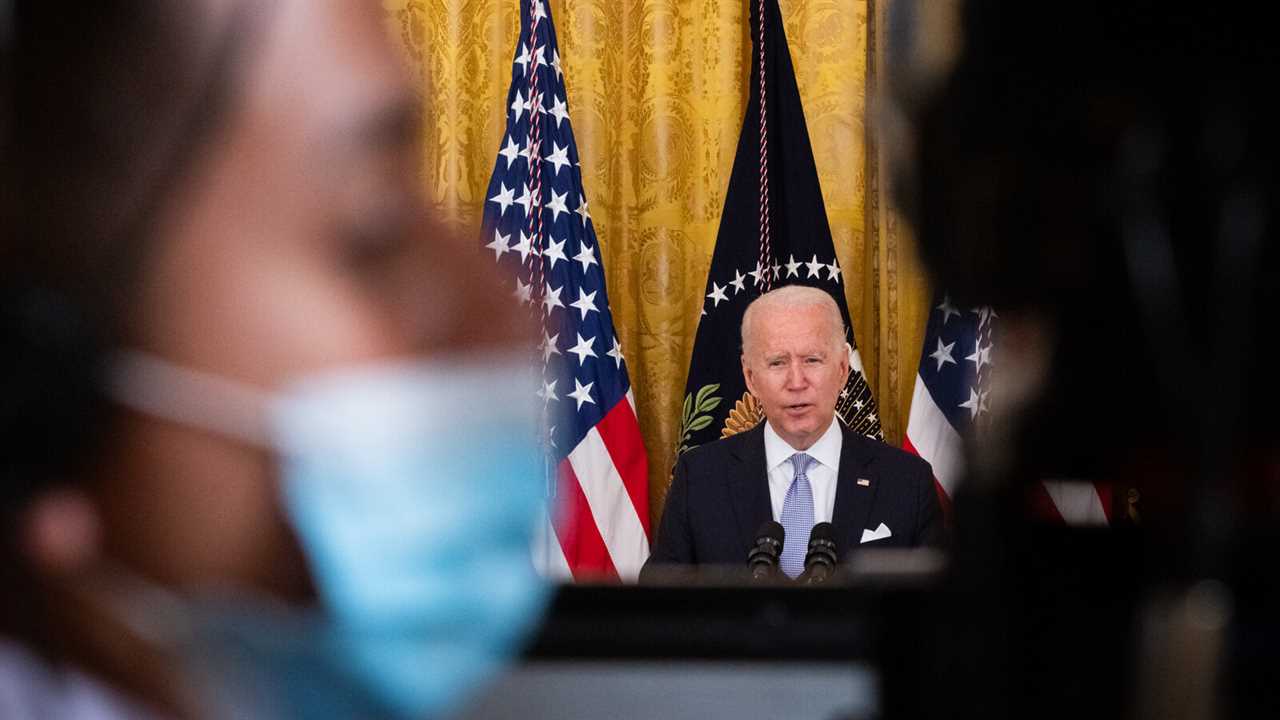
The American political system has come down with a case of long Covid.
In Washington and the states, and in both political parties, expectations that the virus might be routed this summer and make way for some version of political-life-as-usual have abruptly disintegrated. The resurgence of the disease, driven by the fast-spreading Delta variant, threatens to halt plans by both parties to shift their attention to other matters ahead of the midterm elections next year.
President Biden’s hoped-for message that happy days are here again is on hold as the administration’s initially blitzkrieg-like vaccine rollout has slowed to a relative crawl and new debates flare up over public health mandates on inoculation and mask-wearing. There are already fissures in his own party, particularly among labor unions, about how far the government and private businesses should go in requiring employees to take the vaccines.
Even a breakthrough in Senate negotiations this week over a major bipartisan infrastructure deal was crowded in the news by the Centers for Disease Control and Prevention’s reversal of its previous guidance on masking for vaccinated people, and by new vaccine mandates issued by major companies like Google and Facebook and for public employees in states including New York, New Mexico and California.
On Thursday, Mr. Biden took the broadest measures yet to make vaccination or constant testing obligatory for millions of people, including federal workers and military personnel. While he stressed that the country had made great progress since his inauguration in January, Mr. Biden acknowledged that the American escape from the virus had turned into a slog because of the country’s large unvaccinated minority.
“America is divided, between the majority of eligible people who are vaccinated and those who are not,” Mr. Biden said. “And I understand that many of you in the majority are frustrated with the consequences of the failure of the minority to get vaccinated.”
For Mr. Biden’s Republican adversaries, the return of the virus threatens to divert public attention from issues conservatives are eager to campaign on — like crime and inflation — and fix it firmly back on the disease that the Trump administration mishandled with catastrophic consequences.
Hostility to basic mitigation measures among conservative voters and politicians has impeded efforts to contain the virus from the start, and the states where vaccination rates are lowest and new outbreaks are strongest are almost uniformly Republican-leaning. A drawn-out plague disproportionately afflicting red-state America could become an embarrassment for the G.O.P. even as anti-government language on matters of public health becomes an increasingly central strain of Republican messaging.
On Thursday, while Mr. Biden was applauding the Republican Senate leader, Mitch McConnell of Kentucky, for encouraging people in his home state to take the vaccine, a throng of House Republicans were mounting a rowdy demonstration on Capitol Hill against the reimposition of a mask mandate in the chamber. Vaccination rates in the House vary widely between the parties, with many Republicans flaunting a proudly cavalier attitude toward the illness.
But even for political leaders who are uninterested in the coronavirus, it is clear that the coronavirus is interested in them.
“This week I think it’s become unavoidable for all of us to feel that heat turning up again,” said Amy Acton, the former top health adviser to Ohio’s Republican governor, Mike DeWine. “We are once again approaching some sort of inflection point.”
Gov. Michelle Lujan Grisham of New Mexico, a Democrat who this week issued a new vaccination requirement for public employees and urged New Mexicans to don masks indoors, said she was “one thousand percent with the president” in his toughened-up approach to vaccine distribution. (She put her own views on the issue more bluntly: “Shame on you if you won’t get vaccinated.”)
Ms. Lujan Grisham, who is the head of the Democratic Governors Association, said she expected the issue of pandemic management to remain “at the heart” of governing and campaigning at the state level through 2022.
“I think absolutely that will be a cornerstone of all these campaigns,” Ms. Lujan Grisham said. “How you responded to Covid, and what impact it had on the economy, will be front and center.”
The midterm elections are still a long way off, and it is possible that before the autumn of 2022 the pandemic will shrink somewhat in the nation’s political consciousness.
Latest Updates
- N.Y.C.’s mayor says mask guidance will come on Monday, but remains focused on greater vaccination.
- U.S. restaurants scramble to reimpose rules.
- The New York Times delays its return to office, joining other companies.
Mr. Biden’s ambitious legislative agenda is winding its way through Congress, giving the president a chance of trumpeting major successes in 2022 unrelated to the pandemic. Despite the climbing numbers of infections and deaths, the toll is still a fraction of what it was in 2020 before the arrival of multiple highly effective vaccines.
Yet for the moment, it may be difficult to mount a campaign of mass communication on issues that are not tightly bound up with the ongoing public health crisis, including subjects like voting rights and immigration that are high priorities for Mr. Biden’s party. The complexity of resuming in-person business activities and schooling this fall could grow exponentially if cases continue to climb and vaccination rates do not pick up, potentially vexing parents and employers who are impatient to move on from the strictures of 2020 and early 2021.
In polling conducted by the Democratic opinion-research group Navigator, there have been signs of growing pessimism about the trajectory of the pandemic. In early June, the group found more than seven in 10 voters saying that the worst of the pandemic was in the past. By late July, that figure had slipped to 55 percent.
Polls have found that Mr. Biden enjoys consistent support from voters for his handling of the coronavirus, and his determination to crush the pandemic was at the core of his successful campaign.






